Poll of the Week: Battery durability takes precedence over speed
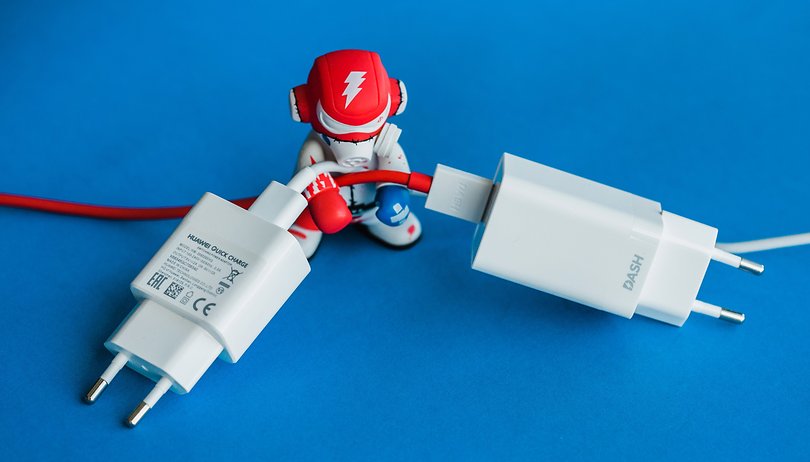

While Chinese manufacturers compete for ever faster charging speeds, NextPit readers don't seem to be in such a hurry. You rather value a longer lifespan for your phones' batteries. At least that's what our poll of the week shows.
We asked you at the end of last week for your opinion on smartphone performance and charging speed. Batteries seem to be a very important topic right now, whether we're talking about quick charging at more than 100 watts, particularly high battery capacities, or even just whether or not a charger is included in the box.
While the term "Quick Charging" is stretched and stretched by the manufacturers – currently we're typically ranging between 15 and 65 watts – there are still a lot of phones in circulation that charge slower than that. Still, the majority of NextPit readers say they're satisfied with the charging time of their current phone. While our English-speaking community can boast a satisfaction rate of 79, the Germans even bring it to a whopping 91 percent!
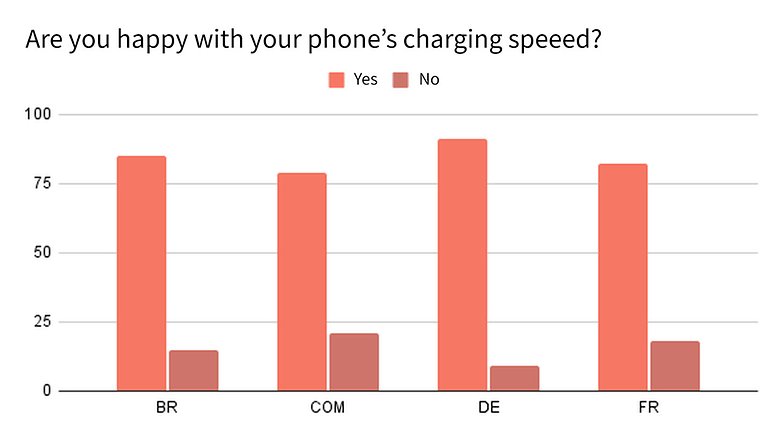
The second answer shows a slight difference between the different domains on which NextPit is published. When asked what charging power is sufficient, the audience on the German, English and Portuguese language websites answered that 25 watts is a sufficient value. That's a charging speed that can be found in most of Samsung's flagships, for example.
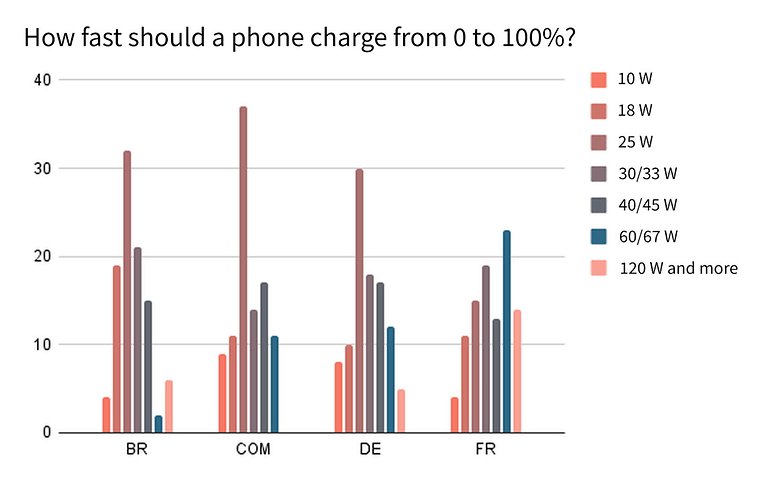
French readers made no secret of their preference for higher wattages, with the "60/67 watts" answer receiving the most votes, accounting for 23 percent of the total. There was also a significant amount of votes for the option "30/33 watts", almost 20 percent. 14 percent of the votes even went for "120 watts"!
A charging power of 120 watts is currently not found in phones sold outside of China. Only the Xiaomi Mi 10 Ultra and the Vivo IQOO 7 can currently offer that. Let's chalk it up to Xiaomi fans trolling, who wanted to inconspicuously point out how superior their favorite brand is, right?
However, the highest power available globally is also only found in models from Chinese manufacturers, such as the BBK family (Oppo, OnePlus and Realme) with their 65W chargers (SuperVooc 2.0, Warp Charge 65 and Dart Charge 65, depending on the brand). In addition, Xiaomi and also Huawei models typically offer 50-watt chargers.
You don't want to wait
Although a large part of you considered 25-watt chargers sufficient in 2021, a different trend emerged when it came to charging time: most readers indicated a preference for a charging time of less to one hour, which is not in line with the previous answer for most current models – with batteries of 4,000 mAh and more.
57 percent (France), 45 percent (nextpit.com) and 37 percent (Brazil) responded that a mobile phone should take a maximum of 60 minutes for a full charge. Meanwhile, German readers were more chill, with 28% each opting for "One hour or less" and "90 minutes" respectively. 16 percent of Germans can live with charging times of up to two hours, and for 15 percent it is even okay if it takes longer than two hours.
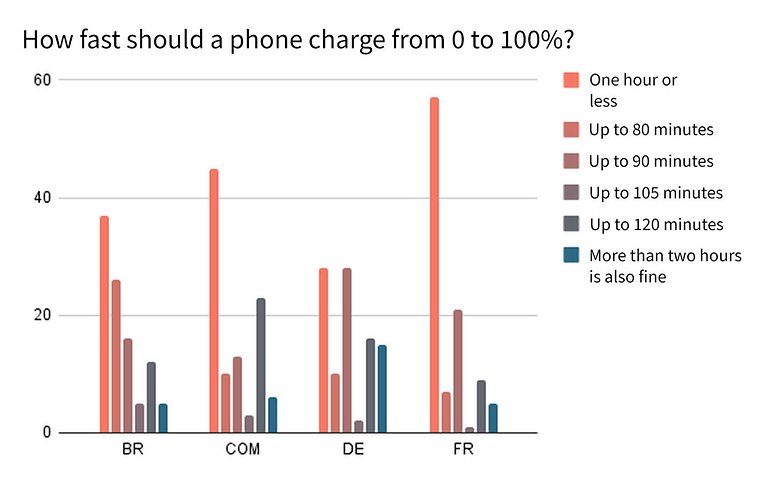
Our reader Tim pointed out the charging limit techniques of some manufacturers, which slow down the process when the battery reaches 80% to avoid too much wear and tear on the battery.
Battery longevity is a priority
The answers to the last question make it clear that while you value fast charging times, speed takes a back seat to longer battery life. And as we know, higher wattages tend to nibble away sensitively at battery life.
Reading Tip on the Topic: Does quick-charging really harm the battery?
Even the French readers who placed the most value on the charger's performance and a short overall charging time answered that they give priority to battery life over the quick-charging function. As many as 57 percent chose this option.
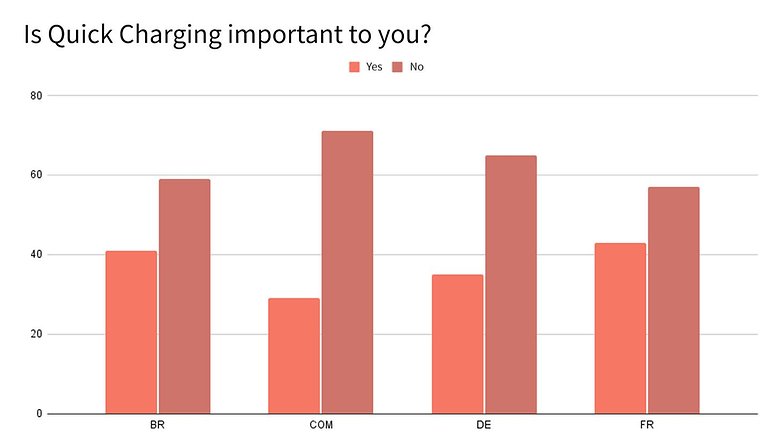
At 59 percent, the percentage of responses in Brazil was very similar to that in France, while the readers of the German and English pages decided more clearly against quick-charging and in favor of longevity, at 65 percent and 71 percent, respectively.
Conclusion
This week's responses show contradictory answers: Many of you would like to be able to refill the batteries in a short time. But there is also a downside: Extremely fast charging shortens the lifespan of the components. In view of this, speed is not so important to you after all.
Looking at upcoming technologies such as Xiaomi's 200-watt system, we can expect the discussion to gain even more momentum in the coming months. Thanks to all the readers who participated in the survey and to those who left their answers in the comments. If you have any suggestions for upcoming polls, feel free to let us know in the comments. See you on Friday as we kick off the weekend with a new poll!
Original poll article from July 9th below.
We live in a time when it is no longer possible to wait up for to two hours for the smartphone battery to be fully charged. On the other hand, we also can't afford to leave the house with a really low amount of battery remaining. The manufacturers' solution to this First World dilemma is simple: fast charging technology. Today, we would like to know just how important this feature is for you!
As a regular at NextPit, you may have already noticed in our reviews that the charging time of the smartphones we reviewed plays an important role in our final assessment. This ranges from the wattage of the adapters that were shipped with the handset to the charging speed of the devices.
To charge it fully, it will take approximately 90 minutes from empty, which is slower than other smartphones. However, that is nitpicking at a very high level.
Carsten Drees, Xiaomi Note 10 Pr0 review
However, before we delve into that topic, I would like to know if you're happy with your smartphone's charging time at the moment.
What fast charging speed is good enough for you?
A month ago, Xiaomi demonstrated their HyperCharge technology, a new 200W wired charging system that is capable of charging a smartphone from 0 to 100% in just 8 minutes. In this demonstration, the manufacturer used a specially modified Mi 11 Pro and a 4,000mAh battery. During the very same demonstration, we also saw the device fully charge in just 15 minutes using a 120W wireless charging setting.
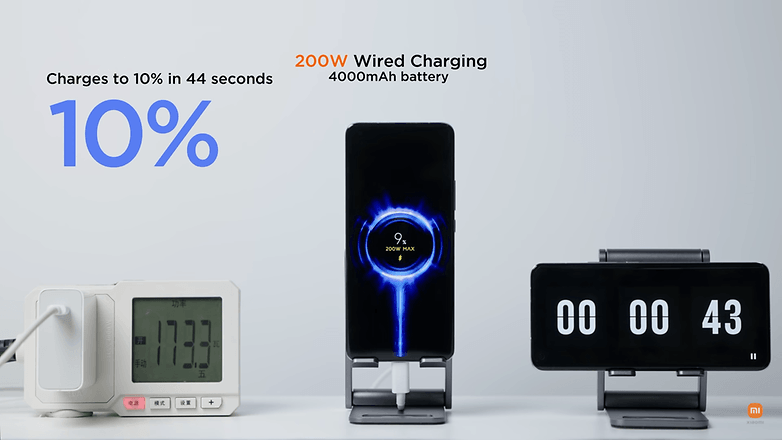 Xiaomi's Hypercharge goes from 0-100% in just 8 minutes / © Xiaomi
Xiaomi's Hypercharge goes from 0-100% in just 8 minutes / © Xiaomi
However, a week later, the company disclosed the side effect of charging smartphones at 200 watts. According to Xiaomi, after 800 charge cycles, the battery still offers an 80% battery capacity which amounts to approximately two years of use. So, after two years, the demonstration model would offer a capacity of 3,200 mAh instead of 4,000 mAh.
With a remaining battery life of 13 percent, I plugged the Realme 8 5G into the nearest power outlet. The battery was half full within 35 minutes and hit 100 percent after 1 hour and 20 minutes. This was rather slow compared to the rest of the competition and also with Realme's very own Dart Charge.
Benjamin Lucks, Realme 8 5G review
In 2021, Oppo also successfully demonstrated a charge time of 20 minutes on a 4,000 mAh battery using a 125 W (wired) charger. By the way, the Oppo Find X3 Pro already managed to deliver a very surprising charge time: in just 10 minutes, the smartphone charged from 0 to 40% using a 65 watt charger.
As you may have noticed, it's no wonder that these quick charge times are often associated with the manufacturers' names as they rely almost exclusively on proprietary charging systems. Thus, Realme, for instance, uses the SuperDart system (65 W); Oppo and their Super VOOC (65 W); while OnePlus has the Warp Charge 30T (30 W) or 65T (65 W). Samsung, Apple and Google use the USB-PD standard, for example, which ends up varying between 18 and 45 W.
The Samsung Galaxy A51 offers an average battery life and nothing else [...] But the real problem is its 'fast charging', which is not fast at all.
Antoine Engles, review of the Galaxy A51 (Samsung's best-selling smartphone of 2020)
Finally, in terms of charging power as mentioned above, charging speed can also deliver the advantage of shorter waiting times, but it also impacts battery life directly as permanent fast charging can cause long-term battery wear issues.
In this sense, charging a device like the Samsung Galaxy A52 5G using a USB-PD charger of just 25W may take longer, but it has its advantages when compared to the Realme 8 Pro's 50W SuperDart charge, for example.
Now I want to know your opinion on this matter: At the end of the day, what is considered as good and fast enough for you when it comes to charging?
How long should a smartphone take to charge from 0 to 100% in 2021?
By now, you might have also noticed that fast charging times are an important part of the portfolio of leading Chinese smartphone manufacturers, right? Hence, I need to inform you that according to industry standards in China, after 400 charge cycles, a battery should be able to retain at least 60% of its original capacity.
This would amount to basically one year of use compared to the previous example we gave concerning Xiaomi's handset. And, let's face it, it's really not a high standard to adhere to. In addition, prices charged by Chinese smartphone manufacturers are normally lower compared to those we see among Apple, Google, Samsung, and Motorola, which makes it possible to change smartphones more often - like on an annual basis, for instance.
I also miss any kind of quick-charging feature that is normally found in competitors to Apple's smartphones. It also hurts that for the very first time in history, Apple has decided to exclude a charging adapter with each purchase of the iPhone 12.
Julia Froolyks, iPhone 12 Pro review
Now, considering factors such as the price of smartphones, the length of ownership time with the same device, and the demand of modern smartphones as a daily driver, how long do you think should a smartphone take to charge from 0 to 100% in 2021?
Is fast charging really that important to you?
Two months ago, I reviewed the Motorola Moto G30, a mid-range smartphone that offers a 5,000 mAh battery with 20 W TurboPower technology. The total charging time of the device, that is, from 0 to 100%, is about 2 hours and 30 minutes.
At that point in time, considering the device's battery life — depending on your usage pattern, it's actually possible to use the Moto G30 for up to two days (or longer) without having to plug the handset into a power outlet. I could even overlook the longer-than-usual (relatively speaking) time required to charge it to the maximum.
5 minutes of charging was enough to jumpstart a completely drained battery to 15%, while hitting the 50% mark in just 20 minutes without exhibiting any signs of abnormal heating.
Rubens Eishima, Realme 8 Pro review
On the other hand, just a few weeks ago as I reviewed the OnePlus Nord CE (which is limited in its distribution based on geographical regions), my experience with the Warp Charge 30T Plus fast charging technology on a 4,500 mAh battery proved to be far superior. In less than an hour of charging, the Nord CE was already loaded to the maximum.
If I had to choose today between one model and the other solely based on battery capacity and fast charging technology, I would vote for the OnePlus device. That's because at the end of the day, you know it wouldn't be a problem to quickly charge it with little time in hand just in case you forgot to charge your smartphone at night and have to leave the house in a hurry.
So I realized that yes, fast charging is really important to me as I don't mind having to charge my smartphone more times during the week. Also, I usually change my smartphone within a 18- to 24-month window. One of the reasons for this is a noticeable decline in battery capacity.
But what about you: is fast charging a really important point? Is it something that makes you choose one device or brand over another? As our survey is not interactive, I invite you to justify your answer in the comments section below, so that we can better understand the results of this survey.
So, did you arrive at the end of this poll happy or sad with the performance of your smartphone's charging technology? As always, I would like to thank everyone in advance who will participate in this survey and share their recommendations in the comments. I wish you all an excellent weekend and, on Monday, my colleague Rubens Eishima will analyze and reveal the final results, as I will be enjoying a well-deserved vacation!


















You're really asking an infrastructure vs use question. Being tied to infrastructure (charging) is a hard limit and basically means your device is inoperative. It's tethered to a cable, or not charging wirelessly if you're using it. The whole point of a cell phone is to free yourself from infrastructure so you're productive in motion.
So you're asking in essence, do you want a cell phone or a landline?
In the good old days I always had a spare battery. I would like to go back to plastic covers and removable batteries.